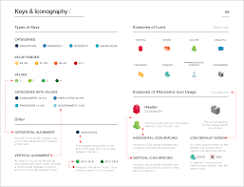Crafting a Distinctive Brand Identity: Key Steps to Success
Creating a Strong Brand Identity: A Key to Business Success
In today’s competitive business landscape, creating a strong brand identity is essential for standing out and attracting customers. Your brand identity is more than just a logo or colour scheme; it encompasses the values, personality, and unique characteristics that define your business.
Here are some key steps to help you create a compelling brand identity:
Define Your Brand Values
Start by defining the core values that your brand stands for. What do you believe in? What sets you apart from your competitors? Your brand values will guide all aspects of your brand identity.
Understand Your Target Audience
It’s crucial to understand who your target audience is and what resonates with them. Tailor your brand identity to appeal to their preferences, needs, and aspirations.
Develop a Unique Brand Voice
Your brand voice reflects the personality of your business. Whether it’s friendly, professional, or innovative, ensure consistency in tone across all communication channels.
Design a Memorable Logo and Visual Elements
Your logo and visual elements should be visually appealing and memorable. They should reflect your brand values and resonate with your target audience.
Create Consistent Brand Messaging
Consistency is key in building a strong brand identity. Ensure that your messaging across all platforms – website, social media, marketing materials – is cohesive and reinforces your brand values.
Establish Brand Guidelines
Create brand guidelines that outline how your brand should be represented visually and verbally. This ensures consistency in all branding efforts, both internally and externally.
A strong brand identity not only differentiates you from competitors but also builds trust with customers and fosters loyalty. By following these steps and staying true to your brand values, you can create a powerful brand identity that resonates with your target audience and drives business success.
Essential FAQs on Crafting a Distinctive Brand Identity
- What are the 4 elements of brand identity?
- How is brand identity formed?
- How do you create a brand new identity?
- How can you create a brand identity?
- What are the 7 steps to brand identity?
What are the 4 elements of brand identity?
When creating a brand identity, it is important to consider the four key elements that define and differentiate a brand. These elements include brand positioning, brand personality, brand values, and brand visuals. Brand positioning involves how a brand is perceived in the market relative to its competitors. Brand personality refers to the human traits and characteristics associated with the brand. Brand values are the fundamental beliefs that guide the brand’s actions and decisions. Lastly, brand visuals encompass the logo, colour palette, typography, and other visual elements that represent the brand visually. By carefully developing and aligning these four elements, a strong and cohesive brand identity can be established to resonate with target audiences effectively.
How is brand identity formed?
Brand identity is formed through a strategic process that involves defining the core values, personality, and visual elements that represent a business. It starts with understanding the brand’s values and what sets it apart from competitors. By identifying the target audience and developing a unique brand voice that resonates with them, businesses can create a strong brand identity. Designing a memorable logo and visual elements, along with consistent brand messaging across all communication channels, plays a crucial role in shaping how the brand is perceived. Establishing clear brand guidelines ensures that the brand identity remains cohesive and consistent, ultimately building trust with customers and driving business success.
How do you create a brand new identity?
Creating a brand new identity involves a strategic process that begins with defining your brand values, understanding your target audience, and developing a unique brand voice. It is essential to design a memorable logo and visual elements that reflect your brand’s personality and resonate with your audience. Consistent brand messaging across all platforms, coupled with the establishment of clear brand guidelines, is key to building a strong and cohesive brand identity. By following these steps and staying true to your brand’s core values, you can successfully create a fresh and compelling brand identity that sets you apart in the market.
How can you create a brand identity?
Creating a brand identity involves a strategic process that encompasses defining your brand values, understanding your target audience, developing a unique brand voice, designing memorable visual elements like logos, and creating consistent brand messaging across all platforms. By establishing clear brand guidelines and staying true to your core values, businesses can craft a compelling brand identity that resonates with their audience and sets them apart in the competitive market landscape.
What are the 7 steps to brand identity?
Establishing a strong brand identity involves a strategic process that consists of seven key steps. These steps typically include defining your brand values, understanding your target audience, developing a unique brand voice, designing a memorable logo and visual elements, creating consistent brand messaging, establishing brand guidelines, and ensuring overall consistency in all branding efforts. By following these seven steps diligently, businesses can create a compelling and cohesive brand identity that resonates with their audience and sets them apart in the competitive market landscape.




